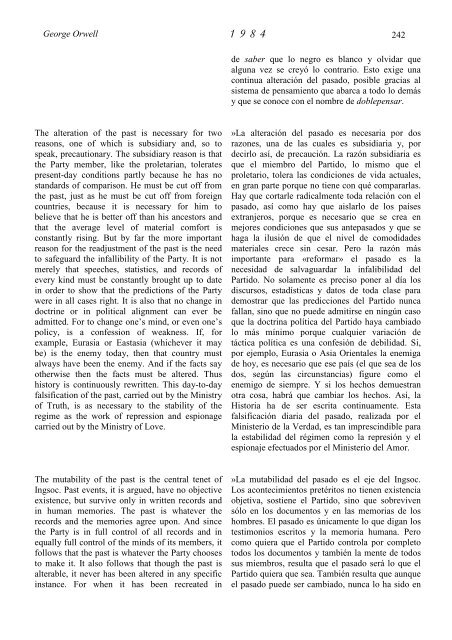Create successful ePaper yourself
Turn your PDF publications into a flip-book with our unique Google optimized e-Paper software.
George Orwell 1 9 8 4<br />
The alteration of the past is necessary for two<br />
reasons, one of which is subsidiary and, so to<br />
speak, precautionary. The subsidiary reason is that<br />
the Party member, like the proletarian, tolerates<br />
present-day conditions partly because he has no<br />
standards of comparison. He must be cut off from<br />
the past, just as he must be cut off from foreign<br />
countries, because it is necessary for him to<br />
believe that he is better off than his ancestors and<br />
that the average level of material comfort is<br />
constantly rising. But by far the more important<br />
reason for the readjustment of the past is the need<br />
to safeguard the infallibility of the Party. It is not<br />
merely that speeches, statistics, and records of<br />
every kind must be constantly brought up to date<br />
in order to show that the predictions of the Party<br />
were in all cases right. It is also that no change in<br />
doctrine or in political alignment can ever be<br />
admitted. For to change one’s mind, or even one’s<br />
policy, is a confession of weakness. If, for<br />
example, Eurasia or Eastasia (whichever it may<br />
be) is the enemy today, then that country must<br />
always have been the enemy. And if the facts say<br />
otherwise then the facts must be altered. Thus<br />
history is continuously rewritten. This day-to-day<br />
falsification of the past, carried out by the Ministry<br />
of Truth, is as necessary to the stability of the<br />
regime as the work of repression and espionage<br />
carried out by the Ministry of Love.<br />
The mutability of the past is the central tenet of<br />
Ingsoc. Past events, it is argued, have no objective<br />
existence, but survive only in written records and<br />
in human memories. The past is whatever the<br />
records and the memories agree upon. And since<br />
the Party is in full control of all records and in<br />
equally full control of the minds of its members, it<br />
follows that the past is whatever the Party chooses<br />
to make it. It also follows that though the past is<br />
alterable, it never has been altered in any specific<br />
instance. For when it has been recreated in<br />
242<br />
de saber que lo negro es blanco y olvidar que<br />
alguna vez se creyó lo contrario. Esto exige una<br />
continua alteración del pasado, posible gracias al<br />
sistema de pensamiento que abarca a todo lo demás<br />
y que se conoce con el nombre de doblepensar.<br />
»La alteración del pasado es necesaria por dos<br />
razones, una de las cuales es subsidiaria y, por<br />
decirlo así, de precaución. La razón subsidiaria es<br />
que el miembro del Partido, lo mismo que el<br />
proletario, tolera las condiciones de vida actuales,<br />
en gran parte porque no tiene con qué compararlas.<br />
Hay que cortarle radicalmente toda relación con el<br />
pasado, así como hay que aislarlo de los países<br />
extranjeros, porque es necesario que se crea en<br />
mejores condiciones que sus antepasados y que se<br />
haga la ilusión de que el nivel de comodidades<br />
materiales crece sin cesar. Pero la razón más<br />
importante para «reformar» el pasado es la<br />
necesidad de salvaguardar la infalibilidad del<br />
Partido. No solamente es preciso poner al día los<br />
discursos, estadísticas y datos de toda clase para<br />
demostrar que las predicciones del Partido nunca<br />
fallan, sino que no puede admitirse en ningún caso<br />
que la doctrina política del Partido haya cambiado<br />
lo más mínimo porque cualquier variación de<br />
táctica política es una confesión de debilidad. Si,<br />
por ejemplo, Eurasia o Asia Orientales la enemiga<br />
de hoy, es necesario que ese país (el que sea de los<br />
dos, según las circunstancias) figure como el<br />
enemigo de siempre. Y si los hechos demuestran<br />
otra cosa, habrá que cambiar los hechos. Así, la<br />
Historia ha de ser escrita continuamente. Esta<br />
falsificación diaria del pasado, realizada por el<br />
Ministerio de la Verdad, es tan imprescindible para<br />
la estabilidad del régimen como la represión y el<br />
espionaje efectuados por el Ministerio del Amor.<br />
»La mutabilidad del pasado es el eje del Ingsoc.<br />
Los acontecimientos pretéritos no tienen existencia<br />
objetiva, sostiene el Partido, sino que sobreviven<br />
sólo en los documentos y en las memorias de los<br />
hombres. El pasado es únicamente lo que digan los<br />
testimonios escritos y la memoria humana. Pero<br />
como quiera que el Partido controla por completo<br />
todos los documentos y también la mente de todos<br />
sus miembros, resulta que el pasado será lo que el<br />
Partido quiera que sea. También resulta que aunque<br />
el pasado puede ser cambiado, nunca lo ha sido en


